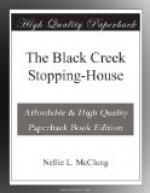The Twelfth of July was a beautiful day, clear, sparkling and cloudless. Little wayward breezes frolicked up and down the banks of Moose Creek and rasped the surface of its placid pools, swollen still from the heavy rains of the “First.” In the glittering sunshine the prairie lay a riot of color; the first wild roses now had faded to a pastel pink, but on every bush there were plenty of new ones, deeply crimson and odorous. Across the creek from Thomas Shouldice’s little house, Indian pipes and columbine reddened the edge of the poplar grove, from the lowest branches of which morning-glories, white and pink and purple, hung in graceful profusion.
Before noon a wagon filled with people came thundering down the trail. As they came nearer Thomas was astonished to see that it was an American family from the Chippen Hill district.
“Picnic in these parts, ain’t there?” the driver asked.
Thomas was in a genial mood, occasioned by the day and the weather.
“Orange walk and picnic!” he replied, waving his hand toward the bluff, where a few of the faithful were constructing a triumphal arch.
“Something like a cake-walk, is it?” the man asked, looking puzzled.
Mr. Shouldice stared at him incredulously.
“Did ye never hear of Orangemen down yer way?” he said.
“Never did, pard,” the man answered. “We’ve peanut men, and apple women, and banana men, but we’ve never heard much about orange men. But we’re right glad to come over and help the show along. Do you want any money for the races?”
“We didn’t count on havin’ races; we’re havin’ speeches and some singin’.”
The Yankee laughed good-humoredly.
“Well, friend, I pass there; but mother here is a W.C.T.U.-er from away back. She’ll knock the spots off the liquor business in fifteen minutes, if you’d like anything in that line.”
His wife interposed in her easy, drawling tones: “Now, Abe, you best shet up and drive along. The kids are all hungry and want their dinners.”
“We’ll see you later, partner,” said the man as they drove away.
Thomas Shouldice was mystified. “These Americans are a queer bunch,” he thought; “they’re ignorant as all get out, but, gosh! they’re friendly.”
Over the hill to the south came other wagons filled with jolly picnickers, who soon had their pots boiling over quickly-constructed tripods.
Thomas, who went over to welcome them, found that nearly all of them were the very Americans whose unholy zeal for their own national holiday had so embittered his heart eight days before.
They were full of enquiries as to the meaning of an Orange walk. Thomas tried to explain, but, having only inflamed Twelfth of July oratory for the source of his information, he found himself rather at a loss. But the Americans gathered that it was something he used to do “down East,” and they were sympathetic at once.




